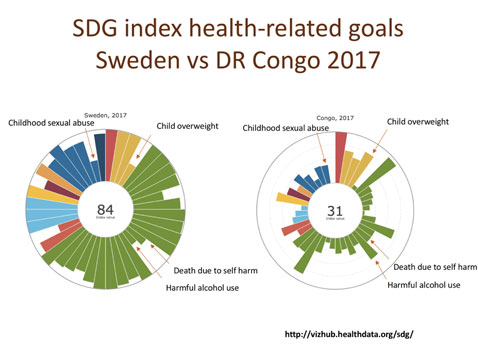Mental Health for All workshop
Today, mental health problems, especially depression, are among the leading causes of disability, and suicide accounts for more than half of all violent deaths worldwide. Knowledge about mental health determinants and about the promotion of global mental health and well-being for all needs to underpin the dissemination of multidisciplinary and multilevel innovative approaches on different societal levels.
Depression can be treated and suicide prevented
Major Depressive Disorder (MDD) affects nearly 300 million people of all ages globally and is the leading cause of disability worldwide. Individuals with depression, including MDD, experience continuous suffering from a serious disease which has a significant negative impact on all aspects of life, including quality of life and function.
Suicide is a significant problem throughout the globe with almost 800,000 people dying by suicide each year, according to official WHO statistics. It is the leading cause of death among adolescents and young adults, age 15 – 29 years. For every suicide there are at least 20 people who attempt suicide every year. Globally, suicide account for 56% of all violent deaths (50% in men and 71% in women).
Suicide is a sensitive issue and even illegal in some countries, and it is very likely that the numbers are under-reported. There exist suicide preventive methods on society, community and individual levels but there are many hindrances to implement them.
United Nations 17 Sustainable Developmental Goals (SDG) – Agenda 2030
In the Agenda 2030, mental and substance use disorders are specifically addressed in the following targets of goal 3:
- 4: By 2030, reduce by one third premature mortality from non-communicable diseases through prevention and treatment and promote mental health and well-being.
- 5: Strengthen the prevention and treatment of substance abuse, including narcotic drug abuse and harmful use of alcohol.
- 8: Achieve universal health coverage, including financial risk protection, access to quality essential health-care services and access to safe, effective, quality and affordable essential medicines and vaccines for all.
When looking at indicators measuring the fulfilment of sustainable development goals related to mental health, including death rate by self-harm and risk-weighted alcohol consumption, as measured by the SDG Index, it becomes clear that high income countries such as Sweden are similarly far from reaching the targets, or even further away compared to many low- and middle income countries. In addition, indicators measuring several of the most potent risk factors for developing mental disorders as depression, such as child abuse and a sedentary life-style (overweight among children) are also are poorly achieved globally.

The global SDG Index score and scores by goal can be interpreted as the percentage of achievement. The SDG Index score signifies a country’s position between the worst (0) and the best or target (100) outcomes.
Knowledge about the global mental health determinants as well as effective platforms for delivery of prevention and promotion interventions is necessary to ensure good mental health and well-being for all. Factors known to influence mental health from cradle to grave include maternal health, nutrition, access to pre-school/kindergarten, neglect, physical activity, education, urbanization, access to green areas, digital environment, socioeconomic status, financial insecurity, social network/family constellations, substance use, expectations, decent work, gender equity, expectations, stigma, social exclusion and care for the elderly. Political and commercial determinants also greatly affect mental health.
In the past 50-100 years, progress in prevention and treatment of communicable and most non-communicable diseases has led to astonishing reductions disability and years of life lost globally. Unfortunately, the same successes have not been achieved in the field of mental health. As a result, the relative burden of mental and substance use disorders is rising on all income levels. This trend has to be reversed, if we are going to achieve the sustainable development goals and ensure healthy lives and promote well-being for all at all ages. The know-do gap needs to be closed.
In conclusion, mental health is a global challenge requiring global solutions using a cross-professional, interdisciplinary approach.
In this workshop we will discuss what role higher education should take in addressing mental health for all. Our specific aims are to list which educational programs need to be revised in order to better prepare future professionals in achieving the mental health related SDGs, and which knowledge, skills and attitudes these programs should develop.
Films:
Black dog depression. https://www.bing.com/videos/search?q=black+dog+depression+video+WHO&qpvt=black+dog+depression+video+WHO&FORM=VDRE
Danuta Wasserman: Att tala om självmord är ett skydd för livet: Riskfaktorer och skyddande faktorer (2015) https://youtu.be/WQet_tA8ugo
Vikram Patel, Mental health for all by involving all, TEDGlobal (2012)
https://www.ted.com/talks/vikram_patel_mental_health_for_all_by_involving_all?language=en
Reading:
World Health Organisation, Preventing Suicide: A global imperative (Report, 2014)
https://www.who.int/mental_health/suicide-prevention/world_report_2014/en/
World Health Organisation, Mental Health ATLAS 2017 (2018)
https://www.who.int/mental_health/evidence/atlas/mental_health_atlas_2017/en/
The Lancet Commission on global mental health and
sustainable development. Vikram Patel, Shekhar Saxena, et al. The Lancet, Vol. 392, No. 10157 https://www.thelancet.com/commissions/global-mental-health
Social determinants of mental health. Jessica Allen, Reuben Balfour, Ruth Bell & Michael Marmot (2014). International Review of Psychiatry, 26:4, 392-407.
Cases for discussion
Academic Conferences - universities in cooperation | Karolinska Institutet, SLU and Uppsala University
SDGsInHigherEd@akademikonferens.se | Tel: +46 18-67 10 03 | www.akademikonferens.se
